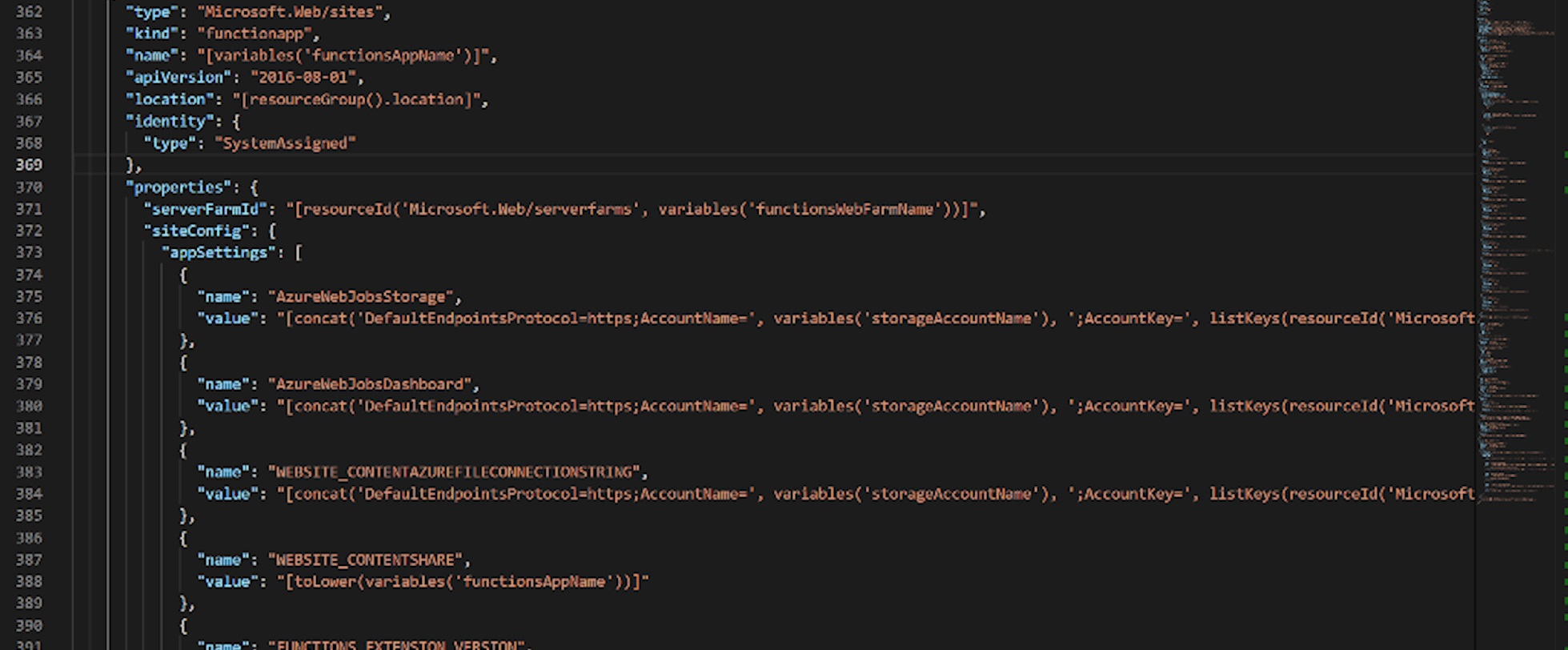Deploying Azure Functions with Application Insights via ARM

Recently I've started playing with Azure Function for real, end-to-end, pushing it to the limits, but that's another conversation. My last mile in mastering them was automatically creating necessary resources in Microsoft Azure via ARM templates. Functions in essence need 4 resources:
- Azure Functions resource itself, where you are deploying your function app to.
- A hosting plan, either web hosting or consumption. Web hosting plan is a classy one that websites use - you are pre-allocating certain resources to use and pay for them regardless whether you are using them or not. Consumption plan is the real deal, because it will charge you per execution time, so if you're not using anything you're not paying anything either. I'd generally recommend consumption plan for all function apps.
- A storage account, which is required by azure functions to store internal state.
- Azure Application Insights for monitoring, unless you are using another monitoring solution.
Application Insights
Creating AI resource is easy:
{
"apiVersion": "2014-04-01",
"name": "[variables('appInsightsName')]",
"type": "Microsoft.Insights/components",
"location": "[resourceGroup().location]",
"properties": {
"applicationId": "[variables('appInsightsName')]"
}
}
Consumption Plan
As well as creating a consumption plan in ARM:
{
"comments": "consumption plan for functions",
"type": "Microsoft.Web/serverfarms",
"sku": {
"name": "Y1",
"tier": "Dynamic",
"size": "Y1",
"family": "Y",
"capacity": 0
},
"kind": "functionapp",
"name": "[variables('functionsWebFarmName')]",
"apiVersion": "2016-09-01",
"location": "[resourceGroup().location]",
"scale": null,
"properties": {
"name": "[variables('functionsWebFarmName')]",
"perSiteScaling": false,
"reserved": false,
"targetWorkerCount": 0,
"targetWorkerSizeId": 0
},
"dependsOn": []
}
Storage Account
No surprises in storage account either:
{
"type": "Microsoft.Storage/storageAccounts",
"sku": {
"name": "Standard_LRS",
"tier": "Standard"
},
"kind": "Storage",
"name": "[variables('storageAccountName')]",
"apiVersion": "2018-07-01",
"location": "[resourceGroup().location]",
"properties": {
"networkAcls": {
"bypass": "AzureServices",
"virtualNetworkRules": [],
"ipRules": [],
"defaultAction": "Allow"
},
"supportsHttpsTrafficOnly": false
}
}
Linking it all together
The last part, the function app itself, is a bit more tricky, especially if you want to automatically integrate azure functions with application insights. The full template is here, and I'll explain the bits as well.
{
"type": "Microsoft.Web/sites",
"kind": "functionapp",
"name": "[variables('functionsAppName')]",
"apiVersion": "2016-08-01",
"location": "[resourceGroup().location]",
"properties": {
"serverFarmId": "[resourceId('Microsoft.Web/serverfarms', variables('functionsWebFarmName'))]",
"siteConfig": {
"appSettings": [
{
"name": "AzureWebJobsStorage",
"value": "[concat('DefaultEndpointsProtocol=https;AccountName=', variables('storageAccountName'), ';AccountKey=', listKeys(resourceId('Microsoft.Storage/storageAccounts', variables('storageAccountName')), providers('Microsoft.Storage', 'storageAccounts').apiVersions[0]).keys[0].value)]"
},
{
"name": "AzureWebJobsDashboard",
"value": "[concat('DefaultEndpointsProtocol=https;AccountName=', variables('storageAccountName'), ';AccountKey=', listKeys(resourceId('Microsoft.Storage/storageAccounts', variables('storageAccountName')), providers('Microsoft.Storage', 'storageAccounts').apiVersions[0]).keys[0].value)]"
},
{
"name": "WEBSITE_CONTENTAZUREFILECONNECTIONSTRING",
"value": "[concat('DefaultEndpointsProtocol=https;AccountName=', variables('storageAccountName'), ';AccountKey=', listKeys(resourceId('Microsoft.Storage/storageAccounts', variables('storageAccountName')), providers('Microsoft.Storage', 'storageAccounts').apiVersions[0]).keys[0].value)]"
},
{
"name": "WEBSITE_CONTENTSHARE",
"value": "[toLower(variables('functionsAppName'))]"
},
{
"name": "FUNCTIONS_EXTENSION_VERSION",
"value": "~2"
},
{
"name": "APPINSIGHTS_INSTRUMENTATIONKEY",
"value": "[reference(concat('microsoft.insights/components/', variables('appInsightsName'))).InstrumentationKey]"
} ]
}
},
"dependsOn": [
"[resourceId('Microsoft.Web/serverfarms', variables('functionsWebFarmName'))]",
"[resourceId('Microsoft.Storage/storageAccounts', variables('storageAccountName'))]"
]
}
You'll notice that function app ARM resource is not a special resource type after all, it's just a normal web app ("type": "Microsoft.Web/sites"), so how do you bind AI resource, and storage to it? And this is done via application properties, weirdly enough!
- AzureWebJobsDashboard is some sort of thing i'm not sure about, something related to logging, it's set by Azure Portal, therefore I've left it here for consistence.
- AzureWebJobsStorage binds storage account to the function app. The value must be a connection string, just like the previous parameter, therefore I'm generating it here. As you can see i'm using built-in string concatenation functions and also getting storage key via ARM functions on the fly, because they are part of the same template
- I'm also not quite sure about WEBSITE_CONTENTAZUREFILECONNECTIONSTRING but again it's present in the resource generated by Azure Portal so I've added it here for consistence as well. If you know what it does, please comment here.
- Same goes for WEBSITE_CONTENTSHARE - it was set to the application name, which I'm also generating.
- FUNCTIONS_EXTENSION_VERSION is responsible for setting which functions runtime you are using. ~1 is old Functions v1 runtime, but i'm using new shiny .net core v2, therefore it's set to ~2.
- APPINSIGHTS_INSTRUMENTATIONKEY is an important key which sets off integration with Application Insights. This means that every function execution will be logged and you will see it in Azure Portal nicely as well. Through trial and error I've discovered that this parameter name must be capitalised, otherwise it won't work. I'm declaring AI resource in the same ARM file, therefore I can get AI key by referencing it.
Once deployed, there is no difference between function app created manually via the portal and via arm template.
Thanks for reading. If you would like to follow up with future posts please subscribe to my rss feed and/or follow me on twitter.
